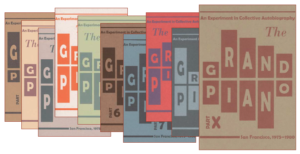2022 marks the tenth anniversary of the publication of The Grand Piano and its celebration in a series of multi-voiced performances in New York, Berkeley, San Francisco, and Los Angeles. A decade in the making, a decade later, The Grand Piano invites new readers, and a new reading.
The collective autobiographers are less interested in revising the past and more interested in using the narratives of their history to further contextualize the complex poetics and communal history of that poetics for the future . . . to nurture an arena of possibilities where ideas can be exchanged.
—Rob Fitterman, “Futuring The Grand Piano”
Recent comment:
The Grand Piano is invaluable to my own account of Language poetry because it offers a retrospective insight into the historical struggles surrounding the emergence of Language poetry through the eyes of some of its chief protagonists. I hence take The Grand Piano to be as much an experiment in collective historiography as an experiment in collective autobiography. . . . What interests me most about The Grand Piano as a collective writing project are the ways in which the pianists historicize the narratives of their communal history. . . . Barry Schwabsky is right to point out in the first review of the series after its completion in 2010 that the ten poets “seem less to be historicizing their accomplishment than dehistoricizing it—recollecting the time when it was not yet history, when its intentions were still hazy, its meanings uncodified” (2011). In their retrospective accounts, I would argue along these lines, the authors of The Grand Piano are not so much concerned with forging their nostalgic, in Schwabsky’s terms, “idyllic,” account of why and how Language poetry has made history. The poets rather chronicle meticulously and at times painfully the unending series of tensions and conflicts that is the history, both past and present, of Language poetry.
—Lilian Chaitas, from Being Different: Strategies of Distinction and Twentieth-Century American Poetic Avant-Gardes (Leiden, Neth.: Ferdinand Schöningh, 2017), 302–3. For more on Chaitas’s monograph, click here.
Major reviews
Luke Harley, “Poetry as Virtual Community: A Review of The Grand Piano: An Experiment in Collective Autobiography,” Jacket2, 7 February 2013. Click here.
In part due to its demanding format—ten volumes by ten authors, published over a five-year period (2006–10), totaling over 1600 pages—and in part due to the difficult questions of poetics and community it raises, The Grand Piano has only now, more than two years after the last volume saw the light, received the kind of engaged and comprehensive review that will help open its project to readers in all its multiple dimensions. Barry Schwabsky’s 2011 review in The Nation, uploaded to this site, was likewise welcome as an enthusiastic introduction to a broader readership, one that perhaps had not heard of Language writing and would like to know more. Harley’s review, on the other hand, assumes not only familiarity but positional engagement with the movement, these authors, this writing. Working through the debates of the 70s and 80s, as we did in The Grand Piano, Harley’s discussion extends literary history into the concerns of the present; it becomes, as Foucault would have said, a work of effective history. In so doing, his review joins Eleana Kim’s 2001 online history of Language writing to offer a broad overview of the movement, contributing to the work of documenting the past history and present possibility of language-centered poetics. Going beyond mere narrative history, critical readings like Harley’s reinterpret the effort to document the movement as a reenactment of its polemical force—from the archival matter of readings, talks, magazines, and books to its real-time engagement. Given the depth of discussion Harley and predecessors have initiated, one can only hope they will encourage more. La lutte continue! –BW
Barry Schwabsky. “Vanishing Points: Language Poetry Remembered.” The Nation (12 January 2011).
Available in three parts at http://barrettwatten.net/texts/document-12-1-grand-piano-review/2011/01
Summer sale: $50 complete set
The Grand Piano: An Experiment in Collective Autobiography, San Francisco, 1975–1980, by Rae Armantrout, Steve Benson, Carla Harryman, Lyn Hejinian, Tom Mandel, Ted Pearson, Bob Perelman, Ron Silliman, and Barrett Watten. Mode A/This Press, 2006–2010. 10 vols.; 1665 pp. $50 complete set plus postage (see below):
For The Grand Piano web site here
Order direct from Small Press Distribution here













